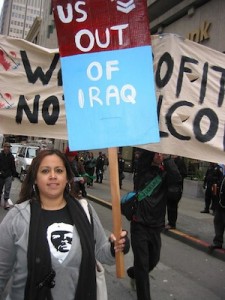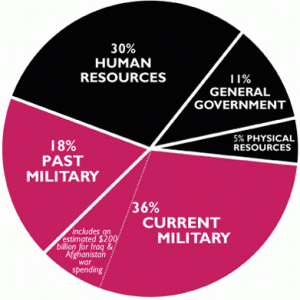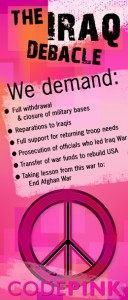This article also appears on The Huffington Post.
By Medea Benjamin and Charles Davis
March 19 marks the eighth anniversary of the invasion of Iraq, a nation that had no weapons of mass destruction and was not involved in the 9/11 attacks. It was sold to the American public as a war to defend our nation and free the Iraqi people. U.S. Deputy Secretary of Defense Paul Wolfowitz said our soldiers would be greeted as liberators and that Iraqi oil money would pay for the reconstruction. Vice President Dick Cheney said the military effort would take “weeks rather than months.” And Defense Secretary Assistant Ken Adelman predicted that “liberating Iraq would be a cakewalk.”
Eight years on, it’s time to look back at that “cakewalk.”
1. 4,400 U.S. Soldiers Lost for a Lie
More than 4,400 Americans have died as a result of the invasion and occupation of Iraq — more than were killed on 9/11. Over 32,000 U.S. soldiers have been seriously wounded, many kept alive only thanks to the miracle of modern medicine.
But those numbers don’t tell the half of it. Stanford University and Naval Postgraduate School researchers who examined the delayed onset of Post Traumatic Stress Disorder (PTSD) found that, by 2023, the rate of PTSD among Iraq war veterans could rise as high as 35 percent. And for the second year in row, more soldiers committed suicide in 2010 than died in combat, a tragic but predictable human reaction to being asked to kill — and watch your friends be killed — for a war based on lies.
2. Bankrupting Our Nation
In 2008, Nobel Prize-winning economist Joseph Stiglitz and Harvard University’s Linda Blimes put the cost of the Iraq War at roughly $3 trillion, or about 60 times what the Bush administration first said the invasion would cost. But while a staggering figure, Stiglitz and Blimes now say that their estimate “was, if anything, too low.” In an update published last fall in the Washington Post, they note that the war not only drove up the federal debt, but helped drive the skyrocketing oil prices that contributed to the crashing of the global economy.
According to the National Priorities Project, the money the U.S. government spent destroying Iraq could have provided yearly salaries for 12.5 million teachers or paid the annual healthcare costs for 167 million Americans. When elected officials tell us our nation is bankrupt, we should tell them to bring our war dollars home.
3. Hundreds of Thousands of Iraqi Dead
The ones who have suffered the most from the Iraq “cakewalk,” of course, are the Iraqis themselves. For an invasion sold as an act of liberation and “profound morality” by propagandists like Jeffrey Goldberg, the U.S. and its allies sure managed to kill a staggering number of those they were liberating. The group Iraq Body Count (IBC) has documented at least 99,900 violent civilian deaths as a direct result of the U.S.-led invasion. But that’s an extremely conservative estimate based largely off deaths reported in Western media, an approach bound to undercount the massive death toll from the invasion. Indeed, as WikiLeaks revealed last October, the U.S. government covered up the violent killings of more than 15,000 Iraqi civilians — killings that weren’t reported by any Western paper — or roughly 20 percent of IBC’s official count at the time.
Unfortunately, the number of Iraqi souls liberated from their bodies is likely a lot higher than IBC’s count. A 2006 study by researchers at John Hopkins University published in the Lancet medical journal found that in just over three years there had been 654,965 “excess Iraqi deaths as a consequence of the war,” with Iraq’s death rate more than doubling due to gunfire — the leading cause of mortality — and a lack of medicine and clean water. A January 2008 analysis by British polling firm Opinion Research Business, meanwhile, estimated “that over 1,000,000 Iraqi citizens have died as a result of the conflict which started in 2003.”
4. Lights Still Out
Thirteen years of bombings and sanctions crippled the infrastructure and basic services of what was once a wealthy country. Then came the 2003 invasion, which destroyed electrical plants, sewage systems, water treatment facilities, hospitals and more. Eight years later, the living conditions of Iraqis are worse than under Saddam Hussein, with the country plagued by a continued lack of electricity, clean water, medical care and security. Iraqis wonder how it is, after the most powerful country in the world occupied it and ostensibly spent billions on reconstruction, they are still living in the dark.
5. Millions Flee Their Homes
According to the United Nations Refugee Agency, since 2003 “more than 4.7 million Iraqis have fled their homes, many in dire need of humanitarian care” — hardly an endorsement of life in the “liberated” nation. Many Iraqis fled their homes to seek asylum in Iran, Jordan and Syria, while roughly 1.5 million fled to other parts of Iraq, the majority of which “have found no solutions to their plight,” according to the UN. In the aftermath of ethnic cleansing, millions will never be able to return.
6. Women and Girls Forced into Prostitution
Women in Iraq have been particularly hit by the invasion and occupation. The Iraqi government estimates there are up to 3 million widows in Iraq today. Meanwhile, violence against women — including honor killings, rape and kidnapping — has soared , forcing many women to remain at home and limiting employment and educational opportunities, according to a new Freedom House report. “A deep feeling of injustice and powerlessness sometimes leads women to believe that the only escape is suicide,” the report notes.
Many Iraqi women who fled to neighboring countries have found themselves unable to feed their children. Just to make ends meet, tens of thousands of them — including girls 13 and under — have been forced into lives of prostitution, particularly in Syria.
“From what I’ve seen, 70 percent to 80 percent of the girls working this business in Damascus today are Iraqis,” one refugee told the New York Times. “If they go back to Iraq they’ll be slaughtered, and this is the only work available.”
7. Poisoning Iraqi Society
The U.S. military dropped thousands of bombs across Iraq laced with depleted uranium, the radioactive waste produced from manufacturing nuclear fuel. Valued by the military for its density and ability to ignite upon impact, depleted uranium bombs continue to kill years after they’ve been dropped. In Fallujah, which was bombarded more than anywhere else in Iraq, British researchers uncovered a massive increase in infant mortality and rates of cancer, with the latter exceeding “those reported by survivors of the atomic bombs that were dropped on Hiroshima and Nagasaki,” according to the Independent.
And it’s not just Fallujah facing a cancer epidemic. Al Jazeera reports that in the central Iraq province of Babil, reported cancer cases rose from 500 in 2004 to 7,000 in 2008. And in Basrah, the last 15 years have seen the childhood leukemia rate more than double, according to a study published last year in the American Journal of Public Health.
8. Trading One Strongman for Another
Saddam Hussein was a bad guy. Yet his worst crimes, including the 1980 invasion of Iran, came when he was backed by the U.S. government, which was well aware of his penchant for torture and extrajudicial killings — talents American officials were fine with so long as he was slaughtering Iranians. Now his U.S.-backed successor, Prime Minister Nouri al-Maliki, is torturing and killing those who speak out against his rule — all he hasn’t done is invade that other, not-yet-liberated member of the “axis of evil.”
Inspired by the mass actions that took down U.S.-backed strongmen in Egypt and Tunisia, thousands of Iraqis have taken to the streets to protest the al-Maliki government — only to be greeted with live ammunition. On February 27, UPI reports that more than 29 protesters, including a 14-year-old boy, were gunned down by the Maliki-run security forces in Iraq. Meanwhile, four journalists in Baghdad report that they, along with hundreds of protesters, were “blindfolded, handcuffed, beaten and threatened with execution” for being insufficiently pro-regime.
The charges of abuse come after WikiLeaks revealed further evidence that Maliki has been using the power of the state — and Shia death squads — to torture and murder his political opponents. Sadly, life in the “new” Iraq isn’t a whole lot different than life under Saddam. Given the protests sweeping North Africa and the Middle East, it seems invasions and foreign military occupations just aren’t as effective at promoting reform as nonviolent protest.
9. A Recruitment Ad for al Qaeda
When it wasn’t being sold as a humanitarian mission, the Bush administration cast the war on Iraq as a response to the 9/11 terror attacks, scaring the American public into submission with vials of faux-anthrax and concocted tales about Iraq’s ties to al Qaeda. Yet as even U.S. intelligence agencies recognized after the invasion,” the Iraq War has made the overall terrorism problem worse,” in the words of one American official. Indeed, there was no better recruitment ad for terrorists than the images the Bush administration and its allies provided of foreign troops destroying Iraqi society. And there’s no better way to create a committed enemy than to kill their family; or in the case of Abu Ghraib, to humiliate and torture – sometimes to death – an innocent loved one.
10. Legitimizing Violence, Rewarding War Criminals
Once you get past all the fanciful lies, rhetoric and rationalizations, the invasion of Iraq was just like any other war: it was about killing — and teaching young men and women to believe that it’s morally acceptable to take the life of another human being, that the supposed ends justify the homicidal means. And a 2007 Army investigation spurred by the massacre of two dozen Iraqi civilians in Haditha said as much.
“Statements made by the chain of command during interviews for this investigation, taken as a whole, suggest that Iraqi civilian lives are not as important as U.S. lives, their deaths are just the cost of doing business, and that the Marines need to get ‘the job done’ no matter what it takes,” wrote Maj. Gen. Eldon Bargewell in the report.
People typically don’t want to kill other human beings. They must be taught to do so; taught to dehumanize the enemy and believe that murdering another is not just okay, but just. That’s what basic training is about: destroying a person’s ability to empathize with the “other” for the good of the nation (or rather, its rulers). But that ability doesn’t just suddenly reemerge when the war is over. And unfortunately, that’s evidenced by the alarming incidents of domestic violence committed by returning veterans.
The invasion and occupation of Iraq will continue to affect lives decades after veterans of the war rejoin civilian life as police officers and husbands, as foremen and fathers. The lesson that violence is an acceptable means to achieve one’s ends is not one soon forgotten.
But violence isn’t just legitimized at base camp: it’s legitimized by the Obama administration’s failure to hold accountable those who took the country into an illegal war of aggression. Those war criminals — the likes of George Bush, Dick Cheney, Donald Rumsfeld, Condoleezza Rice and Karl Rove — are all enjoying successful book tours and hefty speaking fees, while the man who allegedly exposed war crimes, Bradley Manning, is behind bars being tortured. There’s a lesson there — one that doesn’t speak well for our system of government. And it suggests that our political establishment will continue to drag us into wars of choice in the future. After all, they won’t be fighting it. Or paying the consequences for it.
On this shameful anniversary, let’s not forget that despite President Obama’s promise to leave Iraq, the U.S. still has 50,000 troops there, thousands of private mercenaries and dozens of military bases, with generals not-so-subtly hinting at a permanent presence. We should demand the president close those bases and bring the troops home — all of them. We should prosecute those responsible for sending them there. And we should apologize to the Iraqi people for the misery the U.S. government has wrought.
The damage of war has been done. But the U.S. can — and must — begin making amends to Iraq. And it can start by leaving.
Medea Benjamin (medea@globalexchange.org) is cofounder of CODEPINK: Women for Peace (www.codepinkalert.org) and Global Exchange (www.globalexchange.org). Charles Davis has covered Congress for NPR and Pacifica stations, and freelanced for the international news wire Inter Press Service.
—-
Join in protest against the wars in Iraq and Afghanistan at the ANSWER Coalition’s National Day of Action Against the US War Machine. Information for the San Francisco event.
For rallies in your area, see CODEPINK‘s action calendar.
 The recent escalation of sectarian civil-conflict in Iraq is driving a humanitarian catastrophe. Untold thousands are fleeing fighting in northern Iraq. Graphic reports of “cold-blooded executions” of Iraqi army soldiers by victorious rebel forces have been reported in the international media and verified by UN observers.
The recent escalation of sectarian civil-conflict in Iraq is driving a humanitarian catastrophe. Untold thousands are fleeing fighting in northern Iraq. Graphic reports of “cold-blooded executions” of Iraqi army soldiers by victorious rebel forces have been reported in the international media and verified by UN observers.





 The following also appears on
The following also appears on 
 The following article by Global Exchange and Code Pink Co-founder Medea Benjamin also appeared on
The following article by Global Exchange and Code Pink Co-founder Medea Benjamin also appeared on 